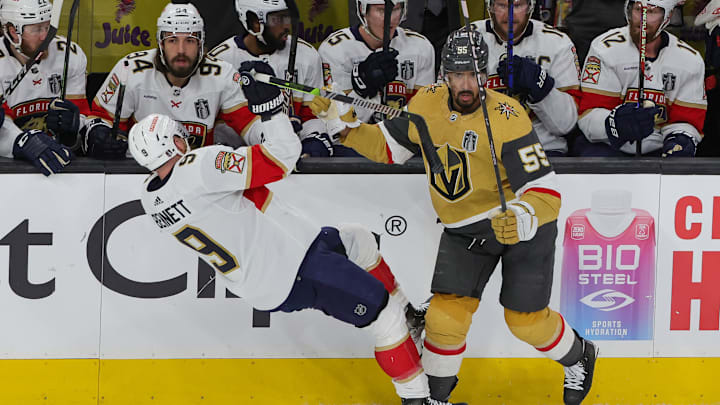The NHL has many rules for its players to follow. Rules such as slashing are meant to keep hockey players safe from harm. Stars like Keegan Kolesar of the Vegas Golden Knights must abide by them or face time in the penalty box. Generally, these are minor penalties that result in a two-minute power play. That's bad news for any team looking to win a hockey game.
It's a tough line to walk for franchises hoping to win. Play a near-immaculate game or risk the consequences. Such is the case in life, where you can't do anything dumb or infringe on the well-being of others. That's how a society maintains its structure, for these rules prevent a Wild West-esque setting. After all, safety is a top priority for hockey players and regular people alike.
But let's examine one of those hockey penalties for a second. Look at boarding, which is a malicious act in the game. What is the definition of boarding? What are the consequences of committing this penalty? No, it's not when a hockey player whips out a surfboard and glides across the ice. Let's get into the basics of this penalty and see what makes this act dangerous.
The definition of boarding in the NHL
Boarding is the intentional act of any player pushing or checking an unsuspecting opponent in a violent or impactful matter. If there's no contact with the boards, the penalty is defined as charging. The penalty's severity depends entirely on many factors, including how violent the play was.
Generally, boarding penalties are minor and result in a two-minute power play. However, there have been cases where a major penalty was assessed. Take Minnesota Wild star Brandon Duhaime's hit on Dallas Stars defenseman Thomas Harley as a perfect example.
He put Harley into the boards, with the referee judging the intent as malicious. Harley was lying on the ice hurt from the impact, with Duhaime being sent off for a game misconduct after. This came after the Stars were up, 5-3, late in the second period. They won that game, 8-3, behind Jason Robertson's two goals and an assist.
That's why players like Keegan Kolesar must be careful on the ice. If they make a wrong move, the Vegas Golden Knights could be short-handed. That could lead to the opposing team scoring a power play goal and swinging the momentum in their favor. That's never a good thing for any NHL team looking to win.
